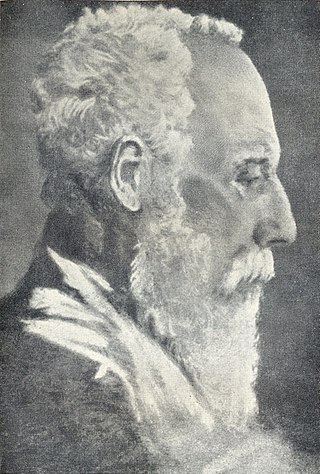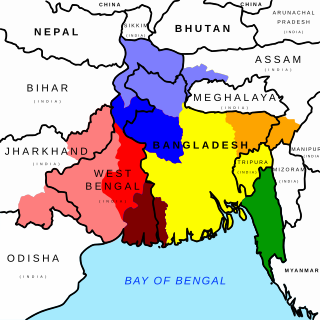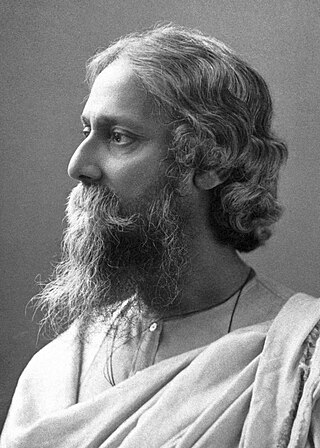
Pohela Boishakh is the Bengali New Year celebrated on 14 April in Bangladesh and 15 April in the Indian states of West Bengal, Tripura, Jharkhand and Assam. It is a festival based on the spring harvest—which marks the first day of the new year in the official calendar of Bangladesh.

Shantiniketan is a neighbourhood of Bolpur town in the Bolpur subdivision of Birbhum district in West Bengal, India, approximately 152 km north of Kolkata. It was established by Maharshi Devendranath Tagore, and later expanded by his son, Rabindranath Tagore whose vision became what is now a university town with the creation of Visva-Bharati. It is also the birthplace of Amartya Sen, an Economist, Philosopher, & Nobel Laureate

Debendranath Tagore was an Indian philosopher and religious reformer, active in the Brahmo Samaj. He joined Brahmo samaj in 1842. He was the founder in 1848 of the Brahmo religion, which today is synonymous with Brahmoism. Born in Shilaidaha, his father was the industrialist Dwarakanath Tagore; he himself had 14 children, many of whom, including Nobel-prize winning poet Rabindranath Tagore, made significant artistic or literary contributions to society.

The culture of Bangladesh is intertwined with the culture of the Bengal region of the Indian subcontinent. It has evolved over the centuries and encompasses the cultural diversity of several social groups of Bangladesh. The Bengal Renaissance of the 18th early 19th centuries, noted Bengali writers, saints, authors, scientists, researchers, thinkers, music composers, painters, film-makers have played a significant role in the development of Bengali culture. The culture of Bangladesh is deeply intertwined with the culture of the Bengal region. Basically, Bengali culture refers to the culture of Bangladesh. The Bengal Renaissance contained the seeds of a nascent political Indian nationalism which was the precursor in many ways to modern Indian artistic cultural expression.

Visva-Bharati, is a public central university and an Institute of National Importance located in Shantiniketan, West Bengal, India. It was founded by Rabindranath Tagore who called it Visva-Bharati, which means the communion of the world with India. Until independence it was a college. Soon after independence, the institution was given the status of a central university in 1951 by an act of the Parliament.

Bolpur is a city and a municipality in Birbhum district in the state of West Bengal, India. It is the headquarters of the Bolpur subdivision. Bolpur municipal area includes Santiniketan. The city is known as a cultural and educational hub of West Bengal. The city is under the jurisdiction of Bolpur and Santiniketan Police station. Bolpur is the largest and most populous city in Birbhum district and 28th most populous city in West Bengal. Located on the banks of Ajay River and Kopai River, Bolpur has been a major human settlement. It is 150 km north of Kolkata and is famous for Visva Bharati, the University set up by the Nobel laureate poet Rabindranath Tagore.

Nabadwip, also spelt Navadwip, anciently Nadia or Nudiya, is a heritage city in Nadia district in the Indian state of West Bengal. It is regarded as a holy place by Hindus, and is the birthplace of Chaitanya Mahaprabhu. Famous for Rass festival where city is illuminated with lights, deities of God and goddesses are made on each corner of Nabadwip town. Hundreds of people gather to this small town on the occasion of raas utsab. Located on the western bank of the Hooghly River, it is considered to have been founded in 1063 CE, and served as the old capital of the Sena dynasty. A center of learning and philosophy in medieval India, the city is still noted for its traditional Sanskrit schools. The Navya Nyaya school of logic reached its peak with the efforts of some well known contemporary philosophers of Nabadwip. The great Vaishnava saint, social reformer and an important figure of the Bhakti movement, Chaitanya Mahaprabhu (1486–1534) was born here. It was after Chaitanya Mahaprabhu's birth that Nabadwip became an important center of pilgrimage for the Vaishnavas worldwide as well as for Hindus in general. Many who follow Gaudiya Vaishnavism visit Nabadwip to celebrate the auspicious birthday day of Shri Mahaprabhu, which, as per lunar calculations, occurs on Phalguni Purnima. This day is commonly known as Gaura-purnima. Aside from this, Nabadwip is visited for various other festivals like Dol Jatra and Rash purnima.

Poush Mela is an annual fair and festival that takes place in Santiniketan, in Birbhum District in the Indian state of West Bengal, marking the harvest season. Commencing on the 7th day of the month of Poush, the fair officially lasts for three days, although vendors may stay until the month-end as per the university regulations. From 2017 onwards, the fair lasted for six days. The key characteristic of this fair include live performances of Bengali folk music, such as baul, kirtan and Kobigan.
Sriniketan is a neighbourhood of Surul in Bolpur subdivision of Birbhum district in the Indian state of West Bengal. It is adjacent to Santiniketan and houses the second campus of Visva-Bharati University. The Palli Samgathana Vibhag and Palli Siksha Bhavana are located in west bengal
Fairs in Birbhum refers to the many fairs that take place in Birbhum district in the Indian state of West Bengal.
Culture of Birbhum refers to the culture of Birbhum district in the Indian state of West Bengal.

The Bengali Calendar, is a solar calendar used in the Bengal region of the South Asia. A revised version of the calendar is the national and official calendar in Bangladesh and an earlier version of the calendar is followed in the Indian states of West Bengal, Tripura and Assam. Unlike the traditional Indian Hindu calendar which starts with the month of Choitro, the Bengali calendar starts with Boishakh because of the reforms made during the reign of the Mughal Emperor Akbar in Mughal Bengal. The first day of the Bengali year is known as Pohela Boishakh which is a public holiday in Bangladesh.

Pohela Falgun, also spelled Poyla Falgun, is a festival observed the first day of Spring of the Bengali month of Falgun in Bangladesh. The celebration was started in 1991 by students of Dhaka University's Faculty of Fine Arts. Before 2019, the first of Falgun used to fell on 13 February of the Gregorian Calendar, however, from 2020 onwards, due to changes to the Bangladeshi calendars, Pohela Falgun is celebrated on 14 February, making the day celebrated with the Valentine's Day in the country. In this day Bengalis are seen to wear traditional clothes consisting of yellow, red and even shades of orange. Some females even prefers to wear bangles and floral ornaments.

Dhaka is the most populous city of Bangladesh and is characterized by its busy urban life and a variety of cultural experiences, including festivals, cuisine, entertainment, shopping, and sites of interest. The nature of these activities mirrors the secular character of the city's population. Important holidays include Language Movement Day, Independence Day, Victory Day, and Pahela Boishakh. Religious festivals include Eid al-Fitr, Eid al-Adha, Durga Puja, Buddha Purnima, etc. The culture of Dhaka is based on the culture of Bengal.

Rabindra Jayanti is an annually celebrated cultural festival, prevalent among Tagorephiles around the world, in remembrance of Rabindranath Tagore's birthday anniversary. It is celebrated in early May, on the 25th day of the Bengali month of Boishakh, since Tagore was born on this day of the year 1268 of the Bengali calendar. Every year, numerous cultural programmes and events, such as: Kabipranam (কবিপ্রণাম) – the songs, poetries, dances and dramas, written and composed by Tagore, are organised in this particular day, by various schools, colleges and universities in Bengal, and is also celebrated by different groups abroad, as a tribute to Tagore and his works. Throughout the globe, Tagore's birth anniversary is largely celebrated at Santiniketan, Birbhum in West Bengal, chiefly in Visva-Bharati University, the institution founded by Tagore himself for the cultural, social and educational upliftment of the students as well as the society. In 2011, the Government of India issued a five-rupee coin to mark the 150th anniversary of Rabindranath Tagore's birth.
Chitranibha Chowdhury was a twentieth-century Indian artist, a member of the Bengal School of Art, and one of the first female painters in Bengal. She created over a thousand artworks, including landscapes, still lifes, decorative art, murals, and portraits. She was a Nandalal Bose student and the first female painting teacher in Kala Bhavana, Shantiniketan. Her real name Nibhanani Bose was changed to Chitranibha Bose by Rabindranath Tagore.

Rathindranath Thakur was an Indian educationist, agronomist, painter, in leathercraft, and a woodworker. He served as the first vice-chancellor of Visva-Bharati University, which was founded by his father, Rabindranath Tagore.

Folk music is one of the genres of music in Bangladesh. It is mainly Bengali's own music. This music talks about the lives of the people of rural Bengal, happiness, and sorrow. There are many parts to it again. It highlights the culture of a country or any region of the country.














